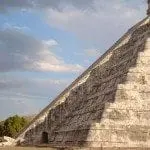Perhaps we should start this by asking who’s really being divisive? (The answer may surprise you!)
It is true that a common concern from church leaders is that the young-earth vs. old-earth debate is dividing the Church. Many times, young-earth creationists are labeled “divisive” for promoting belief in a literal creation week, or the issue is ignored altogether. But where does the division come from, and who is really responsible?
Let’s take a look at what Scripture says. According 2 Peter 3:3-9“…scoffers will come in the last days, walking according to their own lusts,and saying, “Where is the promise of His coming? For since the fathers fell asleep, all things continue asthey were from the beginning of creation.” For this they willfully forget: that by the word of God the heavens were of old, and the earth standing out of water and in the water,by which the world that then existed perished, being flooded with water.”This is an apt description of today’s secular scientific community, which rejects the biblical testimony about creation, the Flood, and the Second Coming, in favor of the idea of uniformitarianism. Uniformitarianism is the idea that only today’s slow-and-gradual processes operating in the natural world, such as erosion of rock and deposition of sediments, can be used to explain earth’s landforms (i.e. the Grand Canyon).
Of course, in order for this to happen, the age of our planet must be millions and billions of years old, not the few thousand years given to us in Scripture. This is well illustrated in a recent video on Youtube, in which Bill Nye “the Science Guy” made the case for evolution by appealing to the millions of years supposedly provided by geology radioactive dating methods. Indeed, the idea of an old-earth is foundational to Darwin’s theory of evolution, without which evolution wouldn’t stand a chance of being accepted. After scientists accepted the idea of an old-earth, it wasn’t long before evolution took foothold in the scientific community. Sadly, the same is true in the Church.
Indeed, the idea of an old-earth is foundational to Darwin’s theory of evolution, without which evolution wouldn’t stand a chance of being accepted. Darwin himself wrote that unless people accepted long ages, as promoted by Charles Lyell who was Darwin’s mentor, friend and founding father of geological thinking about a very old earth, then there was no point in reading Darwin’s own book on evolution. (Ref: Darwin, 1859, Origin, Ch IX, p282) After scientists accepted the idea of an old-earth, it wasn’t long before evolution took a foothold in the scientific community.
For most of its 2,000 years of history, the Church has affirmed a belief in a relatively young earth, sometimes in opposition to the contemporary ideas (for example, St. Augustine of Hippo wrote in opposition to the old-earth ideas of the Egyptians).1 However, during the late 18th and early 19th century, a major shift occurred in the thinking of many geologists regarding the age of the earth. Many geologists rejected the biblical timescale in favor of an earth of vast antiquity. The reason for this was not theological or biblical, but philosophical and spiritual. Most of the originators of old-earth ideas were either deists or vague theists, adopting the idea of a distant, impersonal God that has not operated in the course of world events, especially not in the judgement of the Flood. Unfortunately, most faithful preachers of God’s Word were unprepared to deal with the challenge posed by mainstream geologists, and instead chose to accept old-earth ideas and develop alternate interpretations of the biblical account of Creation and the Flood to accommodate them.2 These theories include the day-age theory, framework hypothesis, and the gap theory.
It is important to note at this point where the controversy started. It didn’t begin with biblical creation ministries or the various attempts at trying to harmonize the Bible with old-earth ideas.Scripture tells us where the divisions come from, “But you, beloved, remember the words which were spoken before by the apostles of our Lord Jesus Christ:how they told you that there would be mockers in the last time who would walk according to their own ungodly lusts.These are sensual persons, who cause divisions, not having the Spirit” (Jude 17-19). This verse directly quotes 2 Peter 3:3 and credits the scoffers as the human source of division. However, the ultimate source of this division goes much deeper. Scripture teaches that such people are “deceiving and being deceived.” (2 Timothy 3:13) Paul warns of such deception in 1 Corinthians 11:3, ”But I fear, lest somehow, as the serpent deceived Eve by his craftiness, so your minds may be corrupted from the simplicity that is in Christ.”
Ever since the beginning, the enemy’s strategy has been to get the people of God to doubt God’s Word. The serpent’s strategy in Eden was to get Eve to question the reliability of God’s Word by asking, “Did God really say…?” Over its history, the Church has dealt with numerousattempts of the enemy to question God’s Word. One of the most recent of these is the poison of naturalistic ideas (millions of years, evolution, etc) wrought in the minds of 18th century ‘freethinkers’ (the ‘scoffers’), which attempt to undermine God’s Word by getting God’s people to question its historicity. Thus, the origin of this division is not man, but the deceptions of Satan.
As Christian believers, we must be willing to take a stand against such destructive doctrines, resting on the truth of God’s Word regardless of the thinking of the day. As Paul commands us in Colossians 2:8, “Beware lest anyone cheat you through philosophy and empty deceit, according to the tradition of men, according to the basic principles of the world, and not according to Christ.” Let us all heed Paul’s warning to Timothy,“O Timothy! Guard what was committed to your trust, avoiding the profaneand idle babblings and contradictions of what is falsely called knowledge— by professing it some have strayed concerning the faith” (1 Timothy 6:20-21).
~Thank you to Creation Research for reviewing, editing, and posting the original article on www.creationresearch.net.
Bibliography:
1Mortenson, Terry, and Thane H. Ury. Coming to Grips with Genesis: Biblical Authority and the Age of the Earth. Green Forest, AR: Master, 2008. 46. Print.
2Ibid, 79-104.






